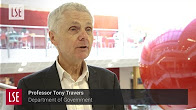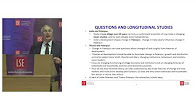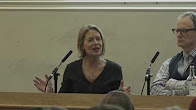source:
London School of Economics and Political Science (LSE)
6:15
LSE Research | Is news reporting fair and objective? Journalists usually try to be observers, but recently something has changed. We now increasingly see journalists living the story rather than just telling it. In this film LSE’s Professor Charlie B...

1:23:20
LSE Events | Working the Phones: investigating control and resistance in the modern workplace Speaker(s): Jamie Woodcock, Dr Alpa Shah
Chair: Professor Bev Skeggs
Recorded on 21 June 2017 at Sheikh Zayed Theatre, New Academic Building
Jamie Woodcock goes undercover in a call centre to re...

0:47
#LSENewsroom | Tony Travers | Brexit negotiations On the first anniversary of the Brexit vote, Theresa May will struggle to gain the upper hand in the EU negotiations as her own authority is weakened, says Professor Tony Travers.

1:27:53
LSE Events | Prof. Christine Chinkin, Prof. Mary Kaldor | International Law and New Wars Speaker(s): Professor Christine Chinkin, Professor Mary Kaldor, Dr Javier Solana
Chair: Professor Toby Dodge
Recorded on 21 June 2017 at Old Theatre, Old Building
By failing to address 'new wars...

1:27:22
LSE Events | Women, Peace and Security in the Global Arena Speaker(s): Nana Bemma Nti, Christine Chinkin, Jeni Klugman, Jacqui True, Torunn L Tryggestad
Chair: Dr Paul Kirby
Recorded on 5 June 2017 at Sheikh Zayed Theatre, New Academic Building
How are ...

1:25:16
LSE Events | Professor Alvin Roth | Marketplaces and Market Design For Slides+Audio please see -
http://www.lse.ac.uk/website-archive/newsAndMedia/videoAn...Speaker(s): Professor Alvin Roth
Chair: Professo...

1:31:48
LSE Events | Jee Kim, Amartya Sen, Katy Wright | Inequalities: changing the terms of the debate Speaker(s): Jee Kim, Professor Amartya Sen, Katy Wright
Chair: Professor Beverley Skeggs
Recorded on 14 June 2017 at Sheikh Zayed Theatre, New Academic Building
Inequalities is a common, if ofte...

1:22:34
LSE Events | Lord Stern, Amartya Sen | Economic development in Palanpur over seven decades A Village, a Country and the Discipline: economic development in Palanpur over seven decades
Speaker(s): Professor Lord Stern, Professor Amartya Sen
Hosted by the International Inequalities Instit...

1:28:30
LSE Events | Dr Jana Uher | How We Judge Others' Personality: gender, ethnicity and questionnaires Speaker(s): Dr Jana Uher
Chair: Professor Julia Black
Hosted by the Department of Psychological and Behavioural Science
Recorded on 8 June 2017 at Old Theatre, Old Building
People often feel the...

1:27:16
LSE Events | Stephen D. King | The End of Globalisation, the Return of History Recorded Monday 12 June 2017
Speaker: Stephen D. King
Chair: Nick Oulton
Hosted by the Department of Economics and Centre for Macroeconomics
Globalisation, long considered the best route to econo...

1:36
#LSENewsroom | Kevin Featherstone | Lessons from the UK election What lessons can we learn from the 2017 election in the wake of Theresa May's disastrous campaign, leaving the country with a hung parliament? Professor Kevin Featherstone says the country is deepl...

1:21
#LSENewsroom | Huseyin Naci | Major flaws in drug approvals A study by LSE Health policy researcher Dr Huseyn Naci reveals the extent to which new drugs are being fast tracked for approval in the US without any strong evidence of their benefits.
More detail...

28:23
LSEIQ Episode 3 | Is social media good for society? To subscribe on iTunes please visit -
https://itunes.apple.com/gb/podcast/lse-iq-podcast/id1223... or search for 'LSE IQ' in your favourite podcast app.
Welcome to LSE IQ, a new monthly podcast...

3:50
LSE Research | Jeremy Corbyn and the Press Academics from LSE's Department of Media and Communications analysed the mainstream media representations of the first few months of Jeremy Corbyn’s leadership of the Labour party. This research fo...

4:35
LSE Student video diary | Alex’s exam experience Recorded over several weeks of exams, Alex tells us about the highs and lows of exam season at LSE.
Contributor: Alex Selway

4:00
LSE Student video diary | Yea Won’s exam experience: managing your stress Yea Won gives her tips for dealing with the inevitable stress of exams in a healthy, productive way.
Contributor: Yea Won Youn

1:24
LSE Student video diary | Alex looks back over his first year at LSE After his last exam, Alex summarises his first-year experience.
Contributor: Alex Selway

1:20:30
LSE MILS 4: Venture philanthropy in action - Sir Paul Marshall and Professor Sir Julian Le Grand 2016/17 LSE Marshall Institute Lecture Series | Lecture 4
Venture philanthropy in action
Speakers: Sir Paul Marshall and Professor Sir Julian Le Grand
Recorded: 17 January 2017
In the fourth Marsh...

1:34:13
LSE MILS 6: Investing for innovation - Nick O'Donohoe and Caroline Mason 2016/17 LSE Marshall Institute Lecture Series | Lecture 6
Investing for innovation
Speakers: Nick O'Donohoe, Caroline Mason
Chair: Stephan Chambers
Recorded: 31 January 2017
The sixth Marshall Ins...

1:31:18
LSE MILS 1: Changing the face of philanthropy, social entrepreneurship and private action 2016/17 LSE Marshall Institute Lecture Series | Lecture 1
Changing the face of philanthropy, social entrepreneurship and private action for the public good
Speakers: Stephan Chambers and Professor ...

1:25:22
LSE MILS 3: If not for profit, for what? - Professor Sir Julian Le Grand and Professor Nava Ashraf 2016/17 LSE Marshall Institute Lecture Series | Lecture 3
If not for profit, for what?
Speakers: Professor Sir Julian Le Grand and Professor Nava Ashraf
Recorded: 22 November 2016
In the third Mar...

1:31:50
LSE MILS 2: Effective altruism: 'Doing Good Better' - William MacAskill and Stephan Chambers 2016/17 LSE Marshall Institute Lecture Series | Lecture 2
Effective altruism: 'Doing Good Better'
Speakers: William MacAskill and Stephan Chambers
Recorded: 15 November 2016
In the second Marshall...

1:29:09
LSE MILS 5: The politics of private action for public benefit 2016/17 LSE Marshall Institute Lecture Series | Lecture 5
The politics of private action for public benefit
Speakers: Jasmine Whitbread, Sir Stuart Etherington
Chair: Sir Thomas Hughes-Hallett
Reco...
 1:00:10 West Meets East in Miniature Ruth Barnes
1:00:10 West Meets East in Miniature Ruth Barnes 1:13:42 The Domestic Material World of New Netherlands Edward S. Cooke, Jr.
1:13:42 The Domestic Material World of New Netherlands Edward S. Cooke, Jr.















































